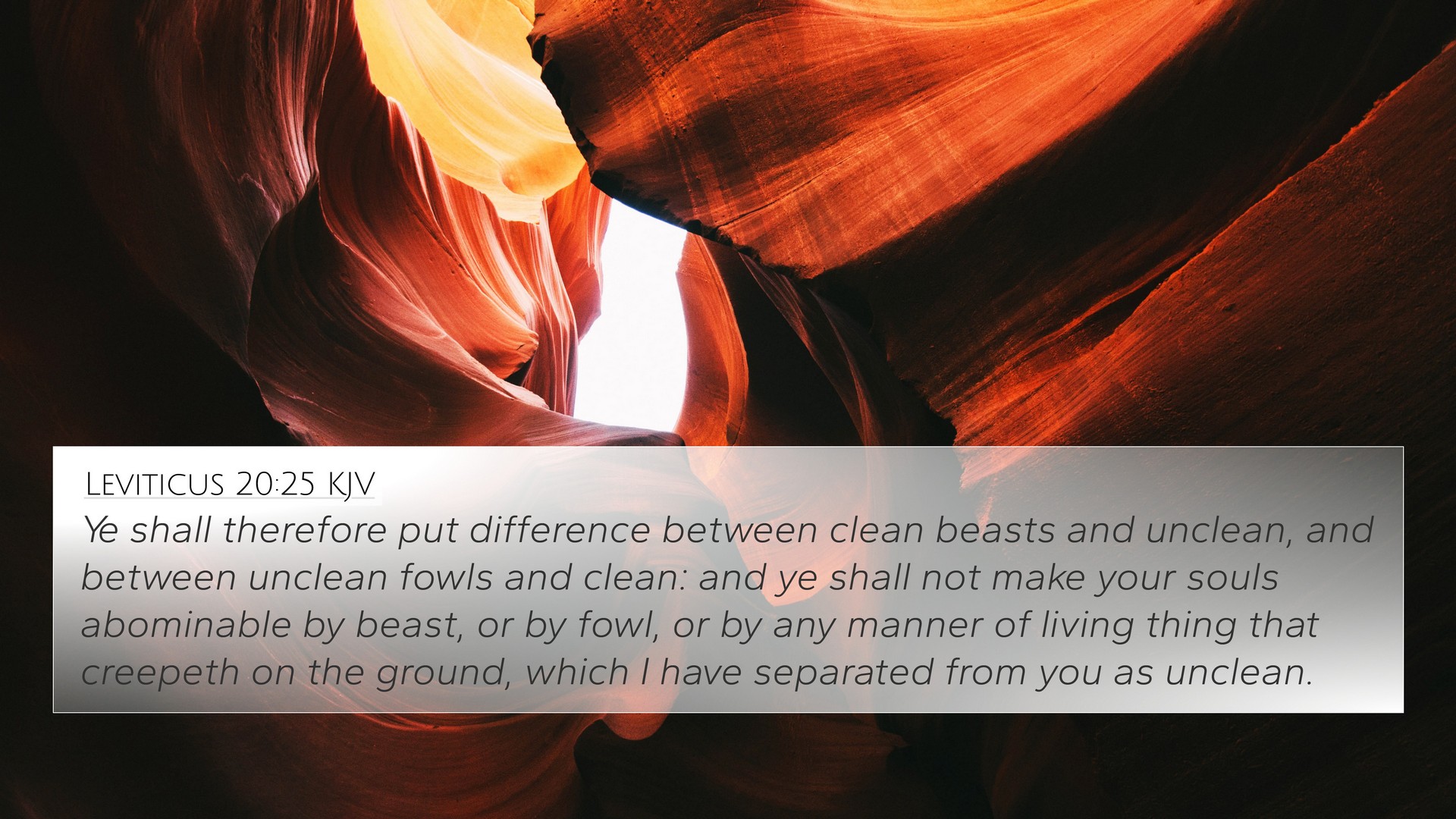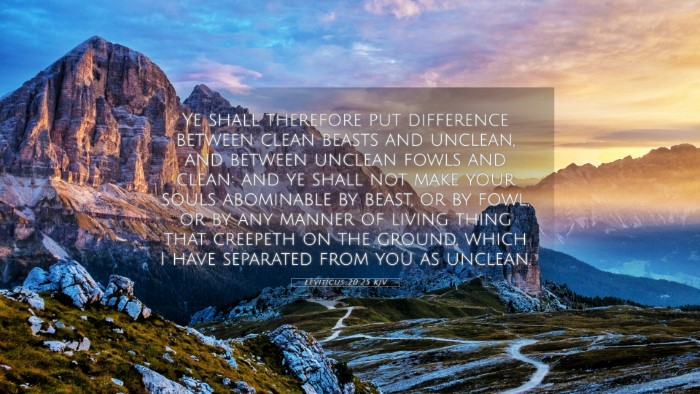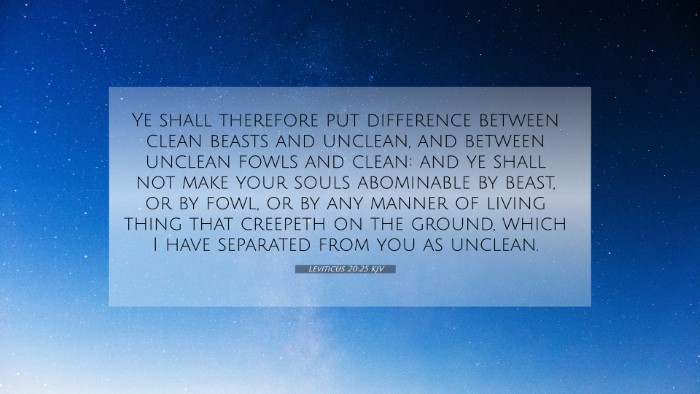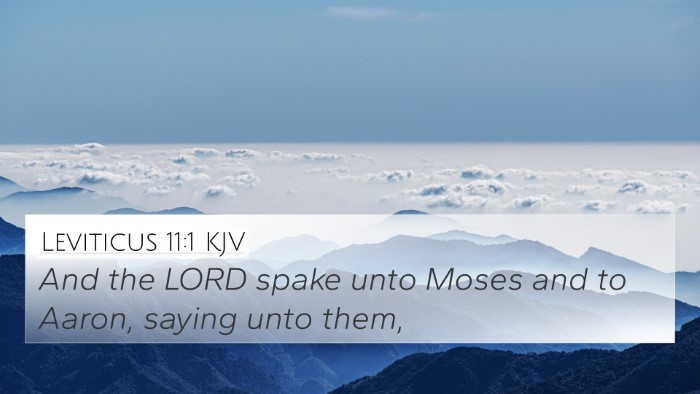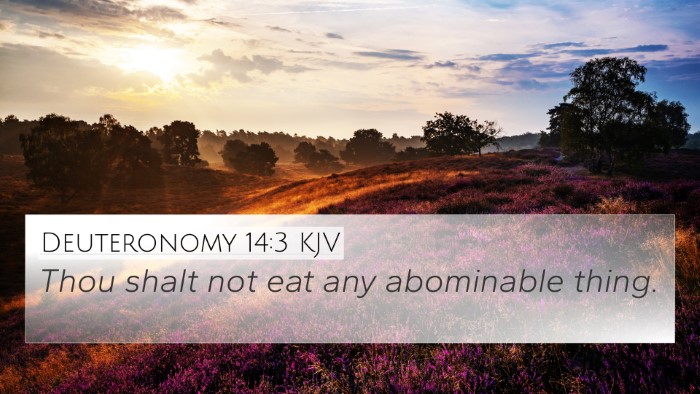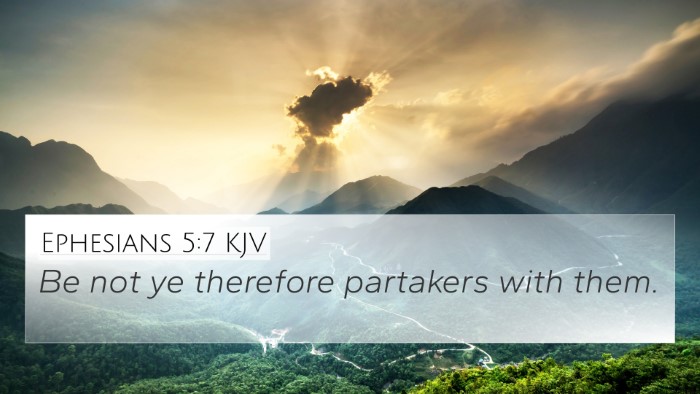Understanding Leviticus 20:25
Verse: "You shall therefore put distinction between clean animals and unclean, and between unclean birds and clean; and you shall not make yourselves abominable by beast or by bird or by any living thing that creeps on the ground, which I have separated from you as unclean."
Summary of Meaning
This verse emphasizes the importance of holiness and purity in the life of the Israelites, as commanded by God. It insists on a clear distinction between what is considered clean and unclean, affecting the dietary practices and overall conduct of the people.
Commentary Insights
-
Matthew Henry: Henry highlights the significance of God's laws regarding dietary restrictions. He indicates that these distinctions serve as a means to keep the people mindful of their covenant with God, fostering a sense of holiness. He suggests that the ceremonial laws were symbolically revealing deeper spiritual truths about separation from sin.
-
Albert Barnes: Barnes points to the practical implications of this verse, emphasizing that these dietary regulations were designed to teach the Israelites discipline and self-control. He interprets the concept of 'clean' and 'unclean' as not only physical states but also spiritual standards that reflect a deeper relationship with God.
-
Adam Clarke: Clarke notes that the distinction in the classification of animals reflects God's authority and control over creation. This verse acts as a reminder that the Israelites should approach God with reverence, maintaining purity in their actions and lifestyle. Clarke further explains how these laws underline the importance of obedience to divine commands.
Cross-References
Leviticus 20:25 has several connections to other scripture passages that further illuminate its meaning:
- Leviticus 11:47: Details about what constitutes clean and unclean animals, expanding on the dietary laws.
- Deuteronomy 14:3-21: Offers additional instructions about dietary regulations, reinforcing the concept of holiness.
- 1 Peter 1:16: "You shall be holy, for I am holy," linking the call for holiness in the New Testament with the Old Testament commandments.
- Isaiah 66:17: A prophecy concerning the fate of those who disregard God's commandments related to cleanliness.
- Mark 7:18-19: Jesus discusses the nature of what makes a person unclean, addressing the underlying principles rather than the physical laws.
- Romans 12:1: Calls believers to present themselves as holy sacrifices, echoing the holiness theme denoted in Leviticus.
- Hebrews 10:29: Warns against trampling the Son of God underfoot, paralleling the seriousness of disregarding God's commands.
- Jeremiah 2:3: Illustrates how Israel's consecration to God involves their adherence to His commandments.
- Matthew 5:17-19: Jesus clarifies His relationship to the law, emphasizing its lasting relevance.
- 2 Corinthians 6:17: Encourages believers to separate from unclean things, directly aligning with the call for distinction in Leviticus.
Thematic Connections
The themes found in Leviticus 20:25 are part of a larger narrative surrounding God's desire for His people to live set apart lives:
- Purity and Holiness: The essence of God's laws, aiming to cultivate a culture of holiness among His people.
- Distinction: The clear separation of clean from unclean acts as both a physical and spiritual metaphor for the Israelites' relationship with God.
- Obedience to God: Through compliance with these commandments, the Israelites express their loyalty to God and His covenant.
- Spiritual Significance of the Law: The laws served not just as dietary guidelines but as a reflection of a deeper spiritual reality about living in accordance with God's will.
Conclusion
Leviticus 20:25 serves as a foundational verse that highlights the importance of maintaining purity and holiness in all aspects of life. Cross-referencing this verse with others enriches our understanding of biblical themes related to cleanliness, obedience, and the eternal call for God's people to live set apart. By exploring these cross-references and engaging with the underlying truths, one can gain a comprehensive view of the relationship between God's commandments and the believer's life.
